Native Son: Making a Little Room For the New

“I can do that?”
“Yep…and I think you should. Just because it’s there now doesn’t mean you have to live with it the rest of your life.”
“But what if I do it and then think it’s a mistake?”
“Then you learn to live with your decision. That’s why you have to decide. It’s not my decision to make.”
As I drove off, the homeowner was still scratching his head over the decision of whether or not to remove a pecan tree that grew about fifteen feet from his front door. I’m guessing it was planted by a squirrel twenty-something years ago.
Two days later, it was gone. A week later, I saw him out in the front yard. “So…how do you like your decision?”
He smiled. “I loved that tree. I love all trees. But it was just smack dab in the way, an obstacle instead of an asset, so I had a guy take it down.” He looked me straight in the eye, “Forty-two minutes. From the time he pulled up to the time he left…forty-two minutes. Drop it, saw it up, load it all in the truck…gone in forty-two minutes. I’ve been wallowing in indecision for years…and all it took was forty-two minutes. ”
“So…how do you feel about your decision?”
He chuckled a little. “I was a little sad at first…until I came home from work the next day and saw my house from the street. I can actually see the house now, and the redbud trees, and that stained glass window on the second story. Best decision I ever made…other than getting my wife to marry me. We decided to make some other long-overdue changes…get rid of that old clothesline we never use…extend the porch…install a flower bed across the front…you know, make the place our own. And,” he added, “We’re planting three live oaks in the back yard…one for each of the kids.”
After all of that, all I could muster was, “Change is good.”
This scenario is familiar to me, as it is to landscape consultants and contractors who attempt to honor and preserve the inherent value of the past while updating old gardens and building outdoor living spaces that serve the needs of a modern world.
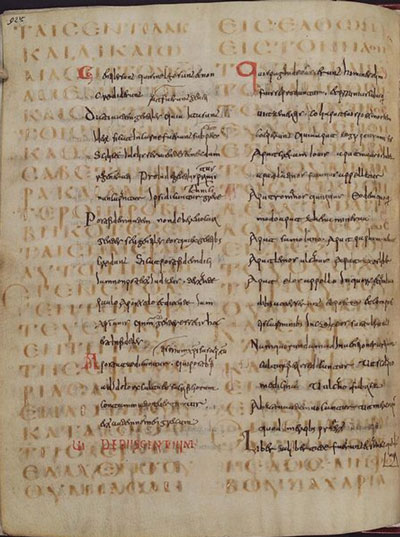
Example of palimpsest. { { PD-US } }
There is actually a term for this layer-upon-layer concept: palimpsest. Literally, this rather clunky word (păl’-ĭmp-sěst) defines an old document that has faded or been erased, so the parchment can be used for a new document, but you can still see remnants of the old document.
A literal example of this occurs on some Agave species. When the thick, leathery leaves expand out from their tightly-packed core, they often possess an impression of the leaf that grew next to them. We plant geeks term this phenomenon “ghosting,” and take great delight in its artistic qualities.
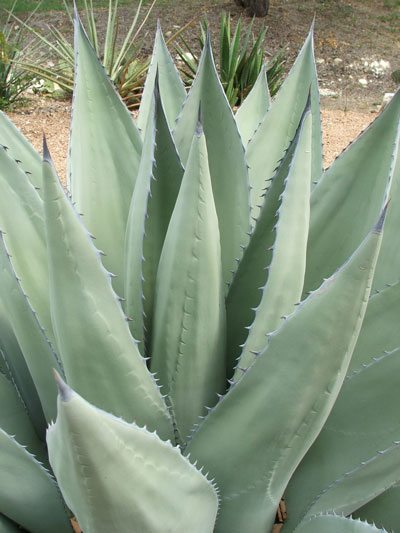
Metaphorically, palimpsest takes on many deeper meanings. Almost every garden is built upon a previous garden. Owners change, their needs change, times change…and we build the new on top of the old, but rarely wipe the slate completely clean. Elements remain of the old garden—stone walls, old trees, boundaries—which connect us to the past, and remind us of those who came before.
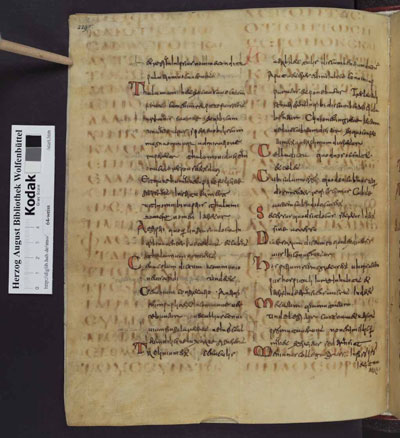
Example of palimpsest. { { PD-US } }
Palimpsest can describe new cities built upon older ones, especially evident in Europe and our own American colonial cities—Boston, NYC, Philadelphia, etc.—where modern skyscrapers erupt up hundreds of feet right next to a quaint little church & cemetery built three centuries ago.
Culturally, we begin to value the old as it becomes more scarce, placing plaques and registering historic landmarks in an effort to prevent our new stuff from completely paving over the past. We revere the beauty and integrity these old elements bring to us, and treasure the tangible evidence left to us by our forefathers.
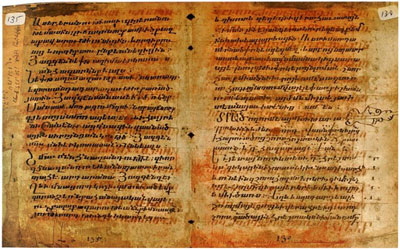
Example of palimpsest. { { PD-US } }
And so it is with me, that as I write these words, I realize my own life is a palimpsest, built upon my father’s foundation. The bricks and mortar of who I am are physically, culturally, and professionally, mirror my father…and his father. I benefit every day from the lives they lived, and am thankful for their legacies that literally flow through my veins. Sure, I have built my own unique life, as it must be, but I am truly grateful for the impressions they made upon me.
So, here’s to Thurman Chamblee (Jr. & Sr.), my father-in-law Mike Corso, and all the other fathers who have given us the parchment upon which we write our own unique lives. Let us write our own stories…remove our obstacles, extend our porches, plant our trees…in honor those who have given us the opportunity to do so.
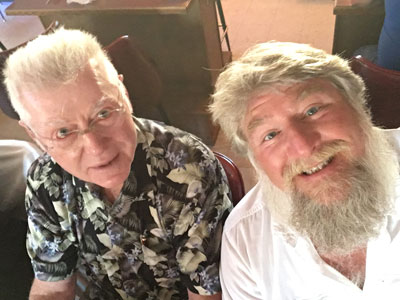
Me and my Daddio.
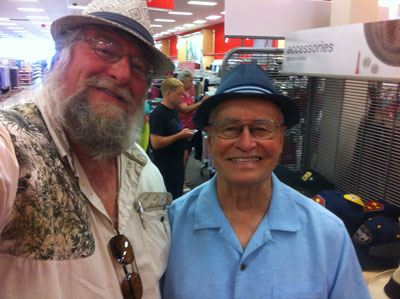
Me and my father-in-law.
_ _ _
Your Lagniappe
My father and I were talking about his father one day, and I commented that Grandpap must have had a tough time shaving, since his beard stubble was as hard as wire. My dad looked at me and said, matter-of-factly, “He didn’t shave. His beard was so tough that he would get a hammer, pound the stubble back in, and bite it off from the inside.”
I need a road trip! I’d love to come out and speak to your group. I’m low maintenance, flexible, and I’ll go just about anywhere…no city too big; no town too small. Just e-mail me at stevenchamblee@yahoo.com and we’ll work something out.
Come see me at Chandor Gardens! Call 817-613-1700 or go to www.chandorgardens.com for details.
